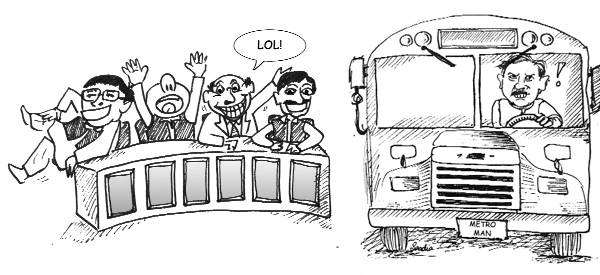
Whose revenues?

Sir,
For the federation of Pakistan to strengthen and prosper, we need to evaluate and separate the assets and revenues generated by each constituent unit and those belonging to the federal government so as to ensure a more equitable distribution for the most deprived sections of society. This needs to be done in the spirit of impartiality.
To begin with, the revenues and taxes paid by federally owned semi-autonomous corporations and their employees serving in head offices, irrespective of their location (such as the National Bank of Pakistan, State Bank of Pakistan, the Civil Aviation Authority (CAA), PIA, Pakistan State Oil, the Oil and Gas Development Corporation, and Ports and Shipping) should be credited to the federal government. Imports and exports from all over the country, including the federal taxes levied on goods shipped from and into Pakistan (other than the excise duty collected for surface transportation) all constitute federal revenues. Ports in any sovereign state are considered part of federal territory. Royalties for natural reserves located in the units must be credited to the provinces, as should the taxes and excise duty collected from those serving in private businesses, retail stores and provincial government-owned corporations.
When Karachi was declared the federal capital in 1947, its infrastructure was developed to house all the federal government offices, the head offices of autonomous and semi-autonomous federal government-owned corporations, the regulatory agencies and banks. Taxpayer money collected from both West and East Pakistan was invested in developing this port city and federal capital. Thereafter, the federal capital was shifted to Islamabad, the master plan for which included residences for all government and state-owned corporation employees.
What makes this a complicated situation can be illustrated as follows: The WAPDA head office is located in Lahore, the National Bank of Pakistan and CAA head offices are located in Karachi, but the revenues they generate are spread across the country and hence cannot be part of the provincial revenues. In all fairness, it would be better if all these head offices and their governing boards were relocated to Islamabad, which would help ease the burden on Karachi, which is already very congested, its infrastructure close to choking point, and the law and order situation deteriorating daily.
Ali Malik,
Karachi.
Transport woes
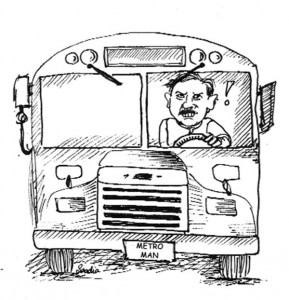
Sir,
I am a long-time resident of Chak Shehzad, Islamabad, and have always enjoyed what used to be a pleasant 25-minute journey to work. In the last year or so, this had become almost an hour’s worth of constant detours, traffic snarls and construction works in progress. The Rawalpindi–Islamabad metro-bus project is now nearing completion and (after many months of proving a constant source of detours and delays on the road) is beginning to resemble a real bus route with real bus stations (although we await the arrival of real buses).
However, this is only half the story. Unless the government invests in mass transit systems for every major city across all key routes and ensures that the road network includes wide pavements and crossings for pedestrians, we cannot hope to cater to the transport needs of a burgeoning urban population. In the end, there is more to mass transit systems than dedicated bus lanes. Such systems need to work in tandem with policies to discourage the intensive use of private vehicles (where more and more households have two or more cars per family and where car pooling is virtually unknown).
A Chaudhry,
Islamabad.
Radio in decline
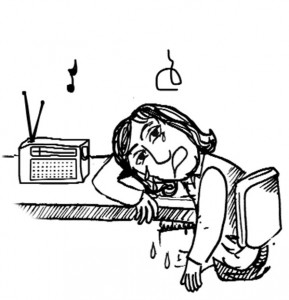
Sir,
As a young girl, I remember listening avidly to FM 100 and enjoying the banter of (relatively) un-pretentious radio jockeys. Several years ago, when FM 89 emerged on the radio scene, it revitalized interest among young people in listening to the radio. It was a versatile station and catered to both popular and jazz music. Best of all, the advertisements were few and far between. Today, I barely turn on the radio. The advertisements are interminably long and on constant repeat. Some of the better radio jockeys (who had a sound knowledge of their chosen genre of music) have been replaced by greenhorns with appalling American accents, who insist on passing off inane banter as witty conversation.
Surely, someone out there has a better vision for the future of radio in Pakistan. There should be no reason to suppose that video has indeed killed the radio star.
Aliya S Hamid,
Karachi.
C-A-T cat
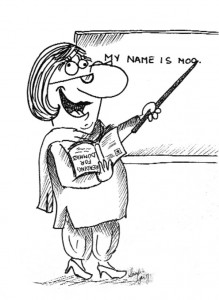
Sir,
I wish to speak about today’s youth and education. Statistics calculated from data from the Social and Living Standards Measurement (PSLM) survey are alarming: only 30 percent of first-grade children in Pakistan recognize numbers. Only 40 percent of third-grade children are able to perform simple subtraction.
Nine percent of third-grade students in Balochistan can read “some” English words. Some 28 percent of fifth-grade children in the province are able to navigate an English paragraph. One would hope these figures might fare better for local languages, but Urdu, Pashtu, and Sindhi show only marginally better results.
What does any of this mean? Simply, today’s educated youth means a narrower gap between people and resources, tomorrow. It means not marrying at 12. It means delaying childbirth to a more respectable age and smaller households less susceptible to poverty. It means being taken more seriously and it starts a virtuous cycle: today’s educated youth is tomorrow’s educated mother and father of suitable age whose birth-spaced children are already learning their a-b-c.
The government must act decisively and it must act now.
Farukh Ali Mahmood,
Lahore.
Power and responsibility

Sir,
This is reference to the MQM’s landslide victory in the NA 246 bye-elections. Having won this election means that the party now has a constitutional mandate to represent this constituency in the National Assembly – but within the confines of the law.
An electoral mandate does not give any political party or individual the right to violate existing laws, engage in extortion, maintain private militias, occupy private or state land or protect criminals. In fact, having taken an oath as members of the National Assembly, the Senate or the provincial assemblies, all elected members have a moral and constitutional obligation to uphold the rule of law, ensure that no private or state property is illegally occupied by anyone and do all within their power to bring criminals to book.
Under no circumstances are elected parliamentarians – including the Prime Minister, the chief ministers, other ministers or paid civil or uniformed public office holders – allowed to derive any powers other than those specified by the Constitution. Moreover, they have no right to violate laws or defy the Constitution or attempt to subvert it.
Pakistan today is in the mess it finds itself because of the abuse of power by elected and paid public office holders who, instead of serving the people and the state, consider that the state is there to serve them. Parliamentarians must be seen to obey the law, pay their taxes, serve as guardians of the national exchequer and ensure that all appointments and recruitments are made strictly on merit.
Other than some monarchies (including those with huge natural reserves), even monarchs in Europe and Southeast Asia have a limited ceremonial role with no financial or key executive powers or the right to make appointments unilaterally.
M Tariq Ali,
Lahore.
Workers, unite
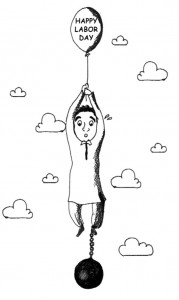
Sir,
1 May is celebrated in Pakistan and in most other countries as Labor Day or May Day, with seminars and rallies taking place to raise awareness of the rights of the working class. But most people know very little about the history of May Day or International Workers Day. During the nineteenth century, the American working class constantly struggled for better working conditions, especially for an eight-hour workday. In 1886, following the Haymarket affair in Chicago – where four demonstrators were killed when the police opened fire after an unidentified person lobbed a bomb at them – the Federation of Organized Traders and Labor Unions decided that all workers would be entitled to an eight-hour day.
In Pakistan, 1 May was declared a national holiday under the government of Zulfikar Ali Bhutto and the working class was brought into the mainstream narrative. But long before this and long before the Chicago workers’ movement, which is known all over the world, the Prophet (PBUH) spoke very clearly of the rights of the working class, instructing his followers to “pay the wages of a laborer before his sweat is dry.”
Ironically, multinational companies based in Pakistan and businesses owned by non-Muslims tend to pay their workers their monthly wage on or before the 1st of every month, while many local or national companies seem unconcerned if their workers are not paid till the 10th of the month or later. Knowing this, do we even deserve to be called followers of the last Prophet (PBUH)?
Even in the 21st century, our labor class continues to live a virtually sub-human life. The sweat and toil they expend for the owners of giant industrial groups does not even entitle them to simple medical coverage, much less other perks and benefits. They spend their lives serving their local masters and when they become too old to work, they are summarily discarded – without a pension or other benefits.
In contrast, government employees receive some relief after retirement: benefits such as free medical care at government hospitals, a provident fund, a pension. For multinational companies, their employees’ interests and wellbeing are an important priority, with separate departments instituted to suggest and implement ways of improving the lot of workers and their families. Employees enjoy a five-day working week and often have access to subsidized medical care, a provident fund, leave with pay, subsidized food during working hours, utilities, a pension, and much more. Moreover, in view of the high inflation rate, almost all multinational companies tend to increase their employees’ salaries in tandem.
Let us now turn to the lot of the worker in national or local organizations. They must work six days a week to provide for their families. Often, they must work overtime to sustain their households, which can have a serious impact on their own health and quality of life. In the absence of healthcare from their employers, they are left to fend for themselves in times of illness. Should the sole breadwinner die, his or her children may be left with no choice but to resort to begging, prostitution and criminal activities.
There was a time in Pakistan when one spoke of the “twenty-two families”. Now, there are probably 2,200. And yet the gap between the burgeoning middle class and the lower class is not taken into account. As long as we fail to provide our workers with safe working environments, higher wages and better facilities, they will have no option but to try their luck in foreign countries – out of sheer desperation – and this will mean losing both skilled and unskilled labor, which will be a great loss for Pakistan’s future development.
A few years ago, while in India in connection with a technical seminar being held there, I was surprised to note a marked difference in the working conditions of a multinational compared to the perks and benefits received by employees of the same multinational in Pakistan. The wages, facilities and working conditions of local organizations there are reasonably at par with those of the multinationals, thus maintaining a better balance and avoiding too large a class difference.
It is imperative that we provide relief to the workers employed by local organizations. Presently, the minimum wage of a skilled worker is simply too low: with the rapidly increasing prices of daily commodities, imagine how such people must live their days, wondering how they will feed their families, pay their medical bills or send their children to school.
Aamir Aqil,
Lahore.

